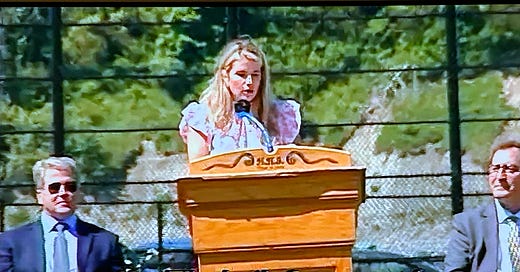That is not a typo, a public high school in Massachusetts invited me to inspire their graduates this past Saturday!!! Usually when a school is contacting me it’s to maintain a several hundred yard clearance but nope not this time!
You can behold my oratory (and the flight path for final descent into Logan) here, beginning at 32 min. Below you can find what I told these glorious young people. What would you say? What do you wish you’d heard at 18? If nothing else, it’s a super fun writing exercise. Oh, the places you will go!
To the class of 2024, congratulations. Congratulations not only for all the hard work you have put in to arrive here today—the studying, the papers, the projects—but I bow to you for what you have been through. And what you have been through will not show up in a grade point average, or class rank, or in a test score. You started high school in the year 2020, in the midst of immense upheaval. When future archeologists encounter your high school diploma and see the year 2024, they will know the parallel story of the world at that time.
And, when archeologists further examine your diploma, they will see that you experienced your formative years in Massachusetts. And I can confidently say, there is no better place to have your character shaped. I grew up 45 minutes down the Pike in Worcester. I live in New York now, and when I meet people there who are from Massachusetts, nine times out of ten they are either from Newton or Wellesley, to which I say, “I’m not from theah!”
In Mass, you grow up learning that the art of insulting your friends is a form of love, Dunkin’ is a ritual and a sacrmanet, and people might think they’re bettah than you, but they are nevah bettah than you. Take this heart and grit that is your Massachusetts birth right and use it as your secret weapon in all things.
So, that’s what the explorers of the future might deduce from looking at your diploma. But going a layer deeper, there is yet another story running alongside the more tangible documents of your achievement. And that is the story of your intuition.
As you enter nascent adulthood, you’re going to be getting lots of advice, some good, some bad. But this is also a phase when listening to yourself is more important than ever and will pay dividends.
I’ve spent the last few years diving deep into intuition, the topic of my next book. I’ve done hundreds interviews with experts, and I have become a scholar of intuition, and intuition is this:
Like blood, intuition is something we are all born with. Most essentially, it is your inner compass. It’s your gut instinct that can rapidly cut through any situation to reveal the most important truth. I imagine over the past four years you have had plenty of experiences with it—perhaps being lit up from a class you took, or going to a party and getting a bad vibe. It is a faculty that orients you toward what is right for you, and away from what is wrong. It doesn’t care about popular opinion or conventional wisdom; it is an inner push toward what is in your highest good and steering you away from what keeps you complacent. And if you learn to hear your intuition, and then even more difficult, learn to trust it, your intuition will lead you to a rich, expansive, perhaps even astonishing life.
It sounds so easy, but it isn’t. We live in a world with so much noise and so many voices—from parents, teachers, friends, the news, from social media, from pings and dings and push notifications—that we rarely give ourselves the space to actually feel our feelings, and reflect on how things sit with us. And this isn’t taught in school, perhaps because it isn’t easily quantifiable. But like a lot of things that aren’t taught in school—like how to apologize, and how to file taxes—these are actually among the most valuable lessons for living.
So how do you develop that inner voice? Everyone, right now, think back to a hard moment you experienced over the past four years. Maybe it was a heartbreak, maybe it was being lost as a first-year student. Teachers, maybe it was challenges in shifting to online learning. Parents, maybe it was an unexpected moment with your precious, perfect graduate. What would you tell that version of yourself? What would you have told a friend in that situation? What was the thing you needed to hear in that moment?
I bet some part of you knew it then, but it was just harder to hear, buried under all the noise. That, my friends, is your intuition.
I urge you to make space throughout your day to hear yourself. If something feels wrong, if your hackles go up, listen to that. If something feels right, even if it is not what you had imagined for yourself, listen to that too.
Let intuition be your guide. And when you can’t find it because sometimes it can be very difficult to access, then rely on presence: be rooted in your reality, opening yourself to the richness of this moment, even when it is hard, as it often is. As Simone Weil said, “attention is the rarest and purest form of generosity.” Extend that generosity to yourself and to the people in your life. That is what will lead you back home. And this home, Massachusetts, is an extraordinary place.




